Semantic Dementia and my Stepfather’s Brief Artistic Inspiration
A few years back, (2016 ) my stepfather, who has advanced semantic dementia (similar to Alzheimer’s disease), had a six month-ish burst of creativity in which he made a series of paintings in acrylic.
He started quite abruptly and stopped cold-turkey when he couldn’t make the color choices any longer.
He had not, to anyone’s knowledge, ever made a drawing or painting in his life before these.
I’ve read that sudden outbursts of creativity are common in people with degenerative brain disease. I suppose, as they get worse and worse at communicating verbally, they’re looking for some other way to express themselves.
At the same time they’re losing inhibitions and self regulation, and suddenly they find themselves able to access a state of un-fettered creativity.
Even though these works are entirely abstract – just color and brush marks – I still imagine a surreal landscape or emotional ‘space’ created by the color.
But there’s no way to know his true artistic intent – or even if there IS a thought process behind the work.
There’s a jibe to be made between art schools: maybe this is no different from any abstract artist. Can we ever know that non-objective painting isn’t just completely random color choices?
At this point he couldn’t sign his name or print letters, or even reliably operate our coffee machine. I watched him spend 20 minutes considering (unsuccessfully) how to assemble a screw, washer and nut. So I was surprised to see this amount of dexterity with a paint brush.
He did some of the work, drawing with the paint tubes directly. Skipping the step of mixing color, using them sort of like a crayon. Squeezing paint onto the canvas.
I had an instructor back in art school who did the same thing, though his works were monumental in size and many inches thick. Very expensive paintings.
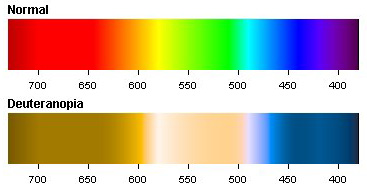
It’s worth noting, my stepfather has been red/green colorblind his whole life. So he sees these works more duo-chromatically than we do. Here’s a chart I found of what that looks like.
That might make the red painting above look like this. (Color adjusted in photoshop). But, as there’s no way to know that for sure, I won’t make this adjustment with all the work.
As well, he’s unable to tell us for sure in which orientation the art should hang. He can make a choice when you have a finished frame to show him, but it’s not clear he wouldn’t change his mind if you asked twice.
We actually didn’t take the time to watch him at work. Which, I now regret. Ironic that I’ve been teaching art for a few years, but we never talked about his things. Of course I thought about trying to help him a bit. But it’s complicated. I didn’t want to do anything to jinx his process. He was producing things at a brisk pace. People get antsy if you hover when they’re painting. So why get in the way?
Anyway, I’ve chosen the orientation for these. and that might impose a context onto them. I tend to think, this one looks like a mountain for instance, so I put it this way up.
If you ask, is it a mountain, or is it a lake, he’ll just agree with whatever you suggest.
I’ve always been somewhat stymied by pure abstraction. Not knowing how to think about it. My own work is fairly literal. I look at the world, and create a personal record. Sure I might exaggerate for effect. But essentially I paint what I see.
With frontotemporal injury, there are people that see vivid hallucinations. Others can look at a clock and all the numbers are jumbled. Some don’t see faces on people’s heads. It’s fascinating to think that these marks might represent something he’s seeing, which we will never understand.
When I look at this pale green surface, my realist’s brain wants to see a forest or jungle. It’s attractive because of the color harmonies. It seems like a ‘good mood’ kind of painting.
His moods will change rapidly over a day. But even prior to losing his self regulation, he wasn’t the kind of person to be in a good mood for long.
This dark forest is a little more of a reflection of his personalty.
I am, in a way, jealous of his freedom to use color and marks without any concern about capturing reality.
It seems like a person with dementia has an advantage over a fully functioning painter who might dabble in non-objective painting, but be unable to set themselves free of describing things.
Unfortunately, his condition is irreversibly progressive.
This burst of visual art was short lived. We didn’t keep exact track of the dates, but I’m recalling, it lasted about six months. Eventually the work began to lose the complexity of mark making and the clarity of color.
These pieces are roughly in chronological order, though there was various amounts of time, and other works, in between.
Just stop and look at this one for a moment.
It might well be a completely random creation with no meaning. Made by a loopy old dude who’s just farting around.
But if you stop and think; this is the artwork of a person who is trapped in his disintegrating mind, aware at times – or possibly at every moment – that he’s lost his intelligence, personality, now his physical independence, and fairly soon his self-awareness will be gone. It’s tempting to say that this guy who can’t speak, or even dress himself, is trying to communicate his state of distress.
He made at least fifty (I haven’t counted exactly) of these paintings on 9×12″ canvas paper and some more on 5×7″ and 8×10″ stretched canvasses.
I think the volume of work is indicative of their importance to him. There was nothing else in this time he would devote more than ten minutes to. He doesn’t listen to music, or watch TV. He won’t sit to be read too for any length of time. Somehow, these were rewarding for him.
He would very much enjoy seeing his paintings framed, or put into portfolio books. And he’s still quite proud of having made these when he sees them today. They’re one of the few things, other than family photos, which he will always comment on.
“I did that. That’s mine”.
Then, one day, there was a sudden decline, and this was as far as he could get.
There’s a few of these essentially unfinished works, done in one color with only part of the surface considered.
Soon after the these pieces, he refused to make any more work, saying he couldn’t do it anymore.
We tried to keep things going by offering him India ink, hoping it would be easier with a single color.
He made about five of these black and white drawings, and would not make any more.
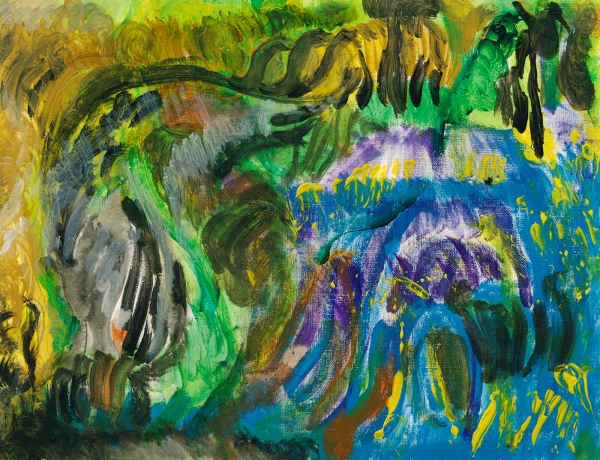
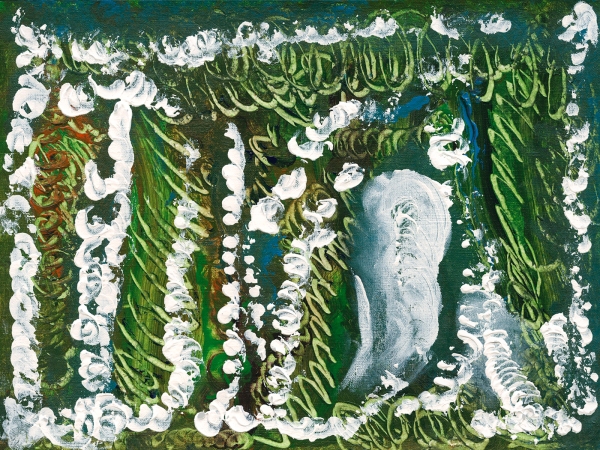
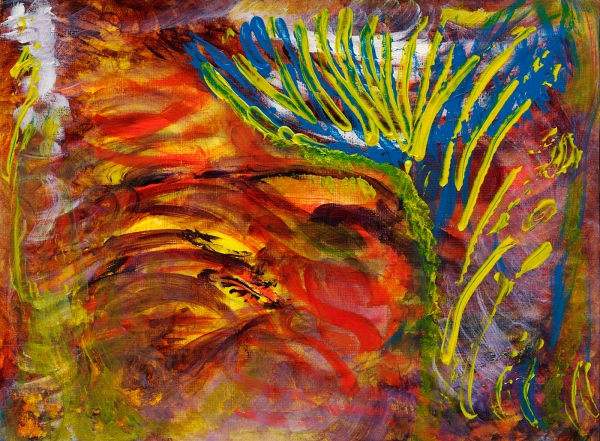
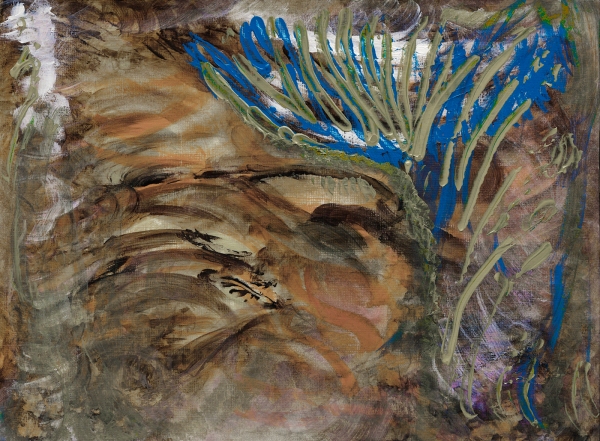
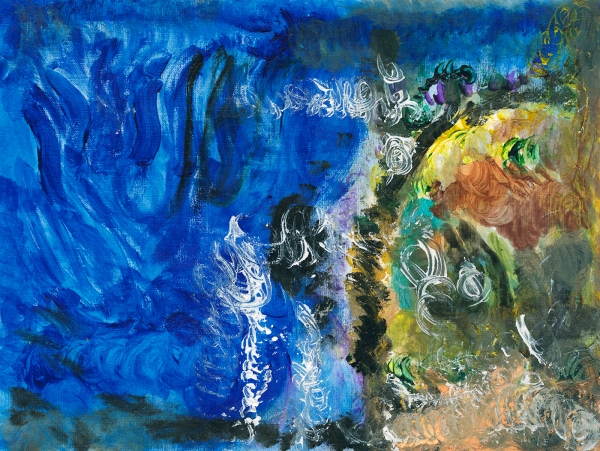
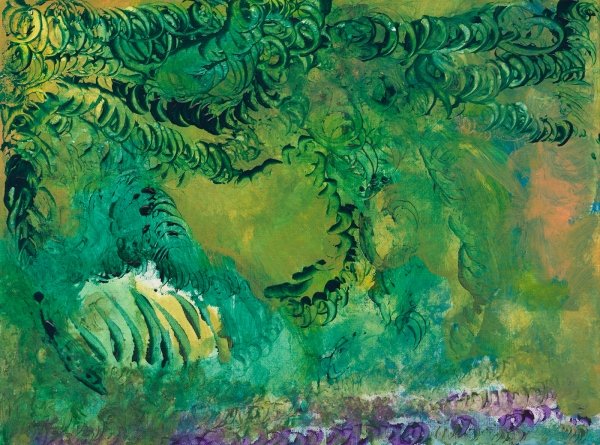
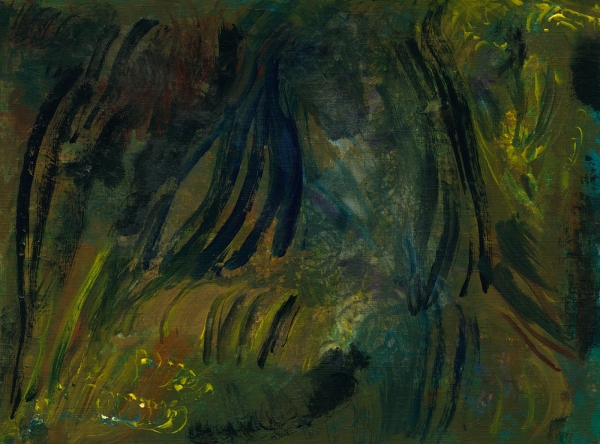

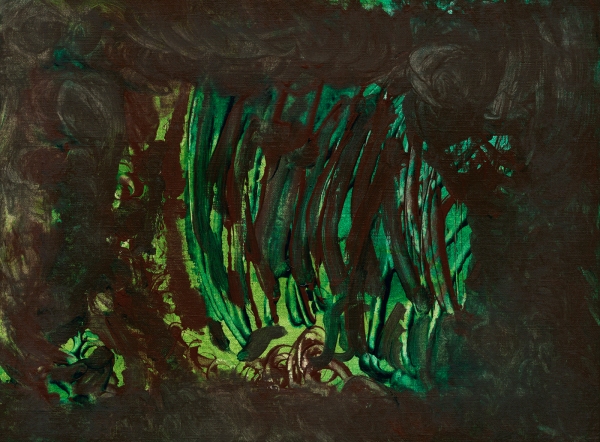
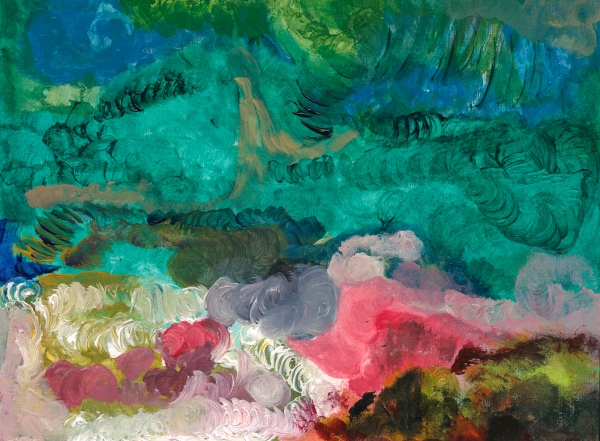
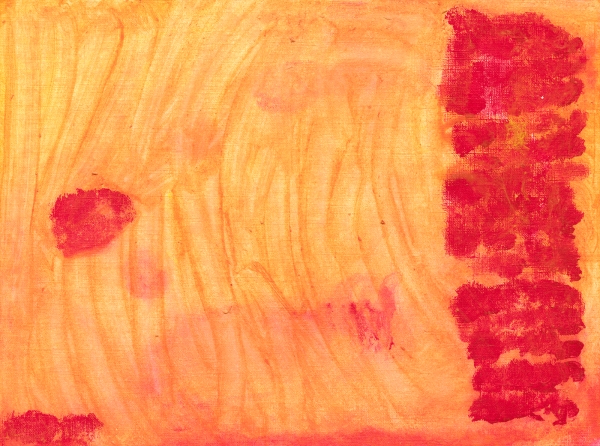
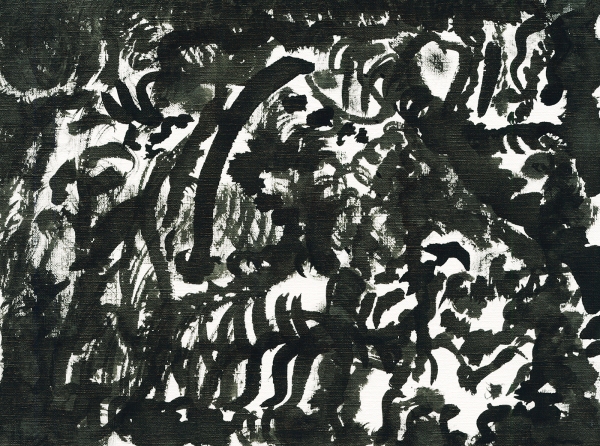
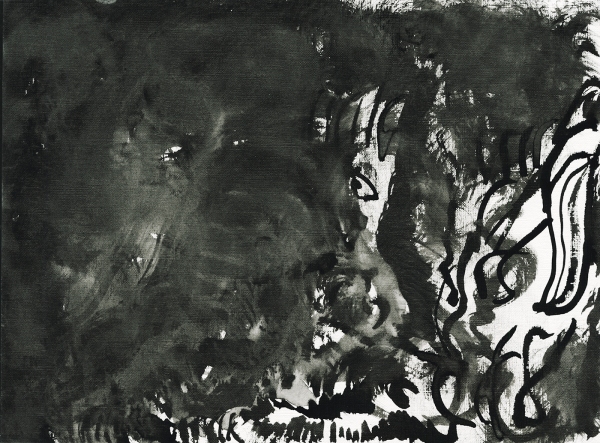
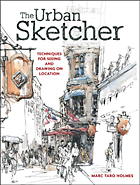
Fascinating! Thanks for sharing.
# 5 looks like the beach. I always wonder at how persons move through situations like these, what they feel. It must be very sad for you guys.
Excellent post with great insight. I think this is another indication of how little we know about the creative process and the mind. I’m impressed he tried to communicate and he chose art to do it. Thanks for posting.
Frank B
What a wonderful story of his creativity and a beautiful collection of his work, albeit from a short period, but I am imagining that it’s execution brought him pleasure and peace.
I very much appreciate your willingness to share and provide a glimpse into the creative moments of your stepfather as he traveled this heartbreaking world of dementia. As we continue to care for my 92-year-old father dealing with Alzheimer’s and my 68-year-old brother-in-law dealing with Parkinson’s Lewy Body Dementia, we, too, are amazed at the abilities that these diseases give and take away so cruelly. Thanks for sharing.
Thanks Marc. I believe there is a subconscious meaning being revealed in all these illustrations. Without being able to communicate what he was feeling one can only guess.
What an incredible post, Marc!
Suzanne Rachel Forbes (aka Rachel McArdle, that’s my legal name!) Suzanne’s Patreon (it’s how I make my living as an artist!) Suzanne on Instagram Suzanne’s blog, ChipinHead.com where you can see all her art
________________________________
Thank you Marc, an inspiring look into someone’s mind, even as it disintegrated. You have managed to make it so positive. I’m glad he had six creative months at least.
My dad, who is living with us now, has Alzhiemers. It is tragic. There is much research on music, art, scent and all things sensual as it relates to dementia. I find this remarkable and to be treasured. I had a student who was an engineer and started taking classes from me in retirement. He was quite good. He got Alzhiemers and His wife asked if she could bring him back to one of my classes. He spoke jiberish mostly by that time, but he could still communicate to me in his paintings and they did remotely resemble his resource photos. It broke my heart and this was long before I knew my father would have it. These are amazing and thank you for sharing.
These are great — it’s wonderful you have them! I’m sorry he stopped … I lost my mother in 2007 at 86 to Alzheimers. It was very sad especially at the end. Blessings to you and your Father and family.
Maybe this is what his mind was seeing. Could he still read the colors on the tubes to know what color he was using? Thanks for sharing .
I’m amazed at their small size. They all look very large: 24 x 30 or larger.
This is a heart-wrenching story of a person’s life. Thank you for sharing this.
Sent from my iPad
>
This is a wonderful group of work with amazing color. If he was aware of doing this, I’d add amazing composition. As a physician, I am fascinated with the human mind. And saddened by dementia. But the beauty of these paintings and the progression is something to wonder about. Your narrative is excellent. Would you consider publishing the paintings and your descriptions? Marc, this is a very special post.The added factor of being color blind really is something to contemplate. Thanks for sharing this.
You are so kind to share these with the world. There is so much we don’t understand and yet we keep looking for connections. My Mother had Alzheimers. It seems that some are combative and some are gentle. My Mother was gentle. I remember the day when she no longer remember who I was. Thank you for sharing.
Oh, Marc, thank you so much for sharing this. It has given me a small window into what might have happened to my mother. She was a artist, painted mainly in oils, some watercolor. But, she was always very realistic in her painting and drawing, saying she could not understand abstract “modern art” as she called it. As she moved further into her decline with Alzheimer’s she quite suddenly stopped painting, saying she could not make them look right. About the same time,she stopped playing the piano because it did not sound right anymore. Seeing your stepfather’s paintings and his abstraction, it makes me think she felt she could no longer control the representation she was used to. Amazing stuff. Thank you so much!
Dear Marc (andL)
Thank you for sharing this stunning look into the world of someone struggling with physical and emotional challenges. It is rare to get to peak at such raw and unbridled emotion. Most touching is his ability to still see himself in his work and for him to be able to lay claim to that. Thank you for sharing his work with us as well as yours and his story.
I agree that he was trying t o communicate his feelings. My paintings and most of my works on paper are all abstract, I believe that non representational art work is pure feeling. When I paint it is all about what is going on in me. When I show my work it makes me so happy when my collectors “get it” and understand my communication, like how we feel about music. I find it interesting now that I am doing urban sketching how the communication of feelings is similar, but different. People want to recognize what you have painted, they think it is successful if it “looks like” the scene.. Often the tendency is to “find” some image in abstract art, But that is not what it is about.. thanks for sharing! Happy New Year my friend!
Very grateful for your sharing these paintings with us, and for your comments. Uplifting and heartbreaking at the same time.
Fascinating Marc! Thank you so much for sharing this.
The one fourth up from the bottom, (greens and pinks) has a Monet quality to it, (when Monet was losing his eyesight). These are really interesting and worth framing. Isn’t it wonderful that he is proud to claim them and knows they are his creations! There are some shown that i’d be glad to have painted. It’s also wonderful that you’ve tried to see them through his color blind perspective. Dementia is a terrifying thing for all in its sphere. In the midst of it here, a good thing happened.
Thank you for your sharing. It’s important to share that kind of experience. It could help someone else.
Hullo Marc
This is a wonderful insight into so many things for me, and although I felt so sad as I read it, I also had a feeling of joy too that your father was able to express himself in such a free, expressive and colourful way. Maybe those characteristics were always there but something changed him along the way to the person that you knew. My father was colourblind, and although It’s unusual in females, I am mildly too but didn’t know until I was diagnosed halfway through art school. My art teacher said that it explained a lot! As it is thought to be hereditary, my son was checked when he was a toddler and he has a fairly profound degree. The colour scale that you provided was very interesting and I haven’t seen it before. Thank you so much for sharing your father’s story and art.
Cheerio, Julie in Australia
Wow! Thank you for sharing this family experience. My husband is color blind and the chart you posted is about what i expected his ‘color’ vision to look like. And my mom has dementia, and was a painter. It will be interesting to see if she has a burst of artist creativity at the end of her life. Her inner critic is very harsh and she doesn’t paint much anymore.
My plein air group will be meeting for a 3 day workshop and I’m going to forward this to them. Our instructor is fast loose and paints very ‘juicy’ water colors. I think we will all be inspired. Thank you!!
I am so sorry to hear about your stepfather’s condition, Marc — he is lucky to have a caring and understanding family that takes an interest in trying to communicate with him, no matter what form the communication takes. While it’s heartrending to see his paintings and wonder what (if anything concrete) they mean to him, it’s also fascinating to see them through your artist’s eyes. Analysis and theories aside, I find them striking, compelling, and beautiful. Thank you so much for this thought-provoking post.
belíssimas pinturas cada quadro tem uma história
What a lovely, sad and interesting post, Marc. I enjoyed reading and seeing the art, which is remarkable. Thank you
How wonderful. Many thanks. There are lots of ways of communicating, Happy your father-in-law had you.
Ruth Weiss ruthweissart@yahoo.com 6886 Antinori Lane Boynton Beach FL 33437 561 731 1717 http://Www.ruthweissart.com http://Www.etsy.com/shop/ruthweissart A colorful experience begins at http://www.artambassador.org
“Children smile 400 times a day….adults 15 times. Children laugh 150 times a day….adults 6 times per day. Children play 4 to 6 hours a day….adults 20 minutes a day. What’s happened?” Robert Holden, British psychologist who studies happiness.
>
I thank you for sharing this today – the paintings, your stepfather, you – more than I can say.
Brilliant and so timely for many of us…i am dealing with a 95 year old Mother and all your comments resonate with what we have been dealing with. Thank you. Thank you.
My past feelings about abstraction were similar to what you describe for yourself. All that changed somewhat when my daughter was a toddler and went through a gestural painting phase that seems characteristic for young children, and then I noticed how similar her child’s drawings were to the paintings of ab ex painter Joan Mitchell. Around that time I also by happenstance got interested in the work of a (now) famous deceased Australian aborigine painter Emily Kame Kngwarreye and I have gradually become more interested in abstraction as a visual form. I still want to paint stuff, and I want the connection to the form of the thing, but I have a keener interest than formerly in the random aspects of the materials. How wonderful that your father in law found something to bring him delight in the midst of profound progressive illness, and lovely that it provides his family with a way to connect with his inner life. Thank you so much for sharing his story and his art. It is inspiring and reveals something triumphant about the human spirit.
Thanks for sharing this!
A really remarkable post, Marc. Thank you so much for this.
Fascinating! Thank you so much for sharing.
Thank you for sharing. It make fascinating reading. My father had a similar experience. Unfortunately he had to go into a home but he said as long as he had paints and paper and could create every day he would be happy. That’s exactly what he did. I joined him most days and he was in a world of his own.
WOW These are amazing! Isnt everything we paint abstract in the end? So much Pure painting here. So free too and quite a sophisticated vision IMHO. Sorry for the circumstances of course.
Marc, I find these paintings and your interpretation touching. I have had problems with anxiety and depression for more than 20 years. Art helps me cope. Any sort of mental health issue can be terrifying. I can identify with your stepfather.
I love the last ones, particularly the ink drawings. i suppose we have an innate desire to create something beautiful.
The one you adjusted to how your father-in-law might see it is far better than with the red – in my opinion! Thanks for sharing these.
I’ve recently watched a video of an abstract artist at work and talking about his paintings. Like you I struggled with understanding them but I now can see that this guy (at least) works from life – landscape/seascape and I feel that I can appreciate them more.
Thank you for sharing Marc. You post is written with understanding and compassion. It is wonderful that your father in law has a loving family. And, I’m certain life in your household carries burdens not experienced by us all. I found his paintings beautiful even though I also struggle with creating and understanding abstraction. We may never know his intentions but perhaps it doesn’t matter. It just confirms how important the act of creation is for humans.
Ken is fortunate to have you to document this in such a compassionate way. Even before my mother was diagnosed with dementia we noticed her art changing, getting darker and more abstract. As her mental capacities diminished, her artistic output slowed down and then stopped. Sadly, we probably kept very little of what she did near the end. It was too painful a reminder to us that we were losing her, slowly, day by day. To look at the paintings was like a knife to the heart — a sad reminder that we would never have that strong, articulate and highly intelligent woman back. Wish I had kept my mom’s later work. Thanks for sharing this with all of us.
I really enjoyed this post. I loved looking at the pieces, trying to figure what might be being said. I am sorry about the way they came about but at the same time so glad he had this outlet. I really appreciate this post. Thank you so much for sharing with us.
Bought your book and some new supplies. You.re definitely my new favorite. Sounds creepy but I am just trying to put words to feelings.
You’ve done a beautiful job of telling your father-in-law’s story. It would be nice to have his paintings assembled into a book to bring more awareness to people with dementia. I thought his paintings were a way for him to express himself and he did an excellent job with form, color, movement and design – but in ‘his way.’ It’s wonderful that he had that period of time to express himself before losing more of his cognitive abilities.
Sadly, my mother had Alzheimer’s disease and lost her ability to sketch and paint, but I was able to save and frame a lot of her work – and so glad I did. Thanks Marc for sharing.
Thanks for sharing these, Marc, and for your interesting commentary on them. Absolutely fascinating.
This is interesting! I really like the artworks!
These are so wonderful to see. Thanks for sharing his personal experience and your insight. This is a big chunk of what art is all about, to me. Tapping into those areas that are beyond human description, and experiencing life on another plane, through our own and other’s eyes, even if just for that short time. Wishing much peace and strength to you and your family.
Thank you for this documentary of art work done by your step father. For 16 years I have worked in a dialysis center. My background was a few short years in elementary art education. I assist patients while on dialysis in crafts and paintings but am NOT an art therapist. I don’t analyze the art but encourage them to try. Most of our patients are elderly, never having held a paint brush. I understand the art you have shown us is produced by one who is suffering a grave mental illness. Stil I see similarities in the freedom and joy art gives to all who dare to try. How wonderful to have these art works to keep alive a spark of artistic freedom. Treasure them without trying to understand them. They are beautiful.
Thank you for this thoughtful and loving article about your step father’s journey. How sad. I took care of my best friend of 50 years who had been a Bible translator for 42 years and watching him struggle for an hour trying to make a medicine schedule. He passed away 3 years ago from cancer which eventually destroyed his brain. How devastating it was to see his mind go long before his body gave up the fight.
nice
wonderful! my mother has Alzeimer’s and i have encouraged her to try to draw, color, etc. i bring simple materials when i visit her, but she has not yet shown interest…i will keep offering. i think she would enjoy it.
Thank you so much for sharing such a personal story in a wonderful and compassionate way. Always learning from your posts ! Take care.
Really love this
Listenig to your story about your mentally declining stepfather is both interesting and moving. I think you have done a wonderful job collecting some of these very expressive and beautiful pieces of painted art. Perhaps your’re right in the fact that reduction in capacity to speak and communicate otherwise, forces the brain to find a path, and what happens then is a burst of energetic painting. Partly color blind, as you tell, and almost demented I think the painter is a genius. Luckily he has a step-son that can see the worth of his communicative art and share it to the world.
janeriwaa@gmail.com
Marc, your article about your mentally declining step-father is both interesting and very moving. I think you’re right in presuming that our need to express ourselves is fundamental. Perhaps you’re also right in thinking that when communication by words and language is blocked, expression takes other paths, in this case through artistic painting. And in your step-fathers case it seems that his need to «say» something about his inner life to the world, is so precarious, that he gets an unprecedented energetic momentum in his artistic work. The paintings you share with us are very fine pieces of colorful and monochromatic abstract painting. Some of them are right out stunningly beautiful. He is indeed lucky to have a canvas, brush and some colors, and above all a step-son able to catch his way of communication, and treat it respectfully. Thank you for sharing this!
admin: Psychological Universe.com
Incredible and touching reflection! Thanks for this Marc!
nice contant thanks for sharing…
Thanks so much for sharing that, very interesting story! I am unfamiliar with that form of dementia and want to look more into it.
Very interesting as I have spent many years working with dementia patients. It has never surprised me at what the mind can do that we are not able to see. Good treasures for sure and thanks for sharing this.
Wow, thank you for sharing… I think what is most fascinating to me is the way he applied and/or used LIGHT in the pieces. They all seemed to be saying something… I had an immediate vision or thought for just about all of them, like he was trying to say something. The light was perfectly place in each one of them. The green you stopped us to view, for instance, made me think of a person in a cage, peering out. Again, the light was significant, here.
Thank you for sharing this. It made me think about my father who had dementia during his last two years. He was also unable to communicate by speaking and i am convinced that he was aware of his condition at all times. We communicated but some sort of telepathy when he was calmer and willing to make an effort. I wish i had thought of offering his some painting materials to help him express himself.
This is one of the most interesting things I’ve ever read on art and drawing. Incredibly sad and fascinating at the same time. Thanks so much for sharing your thoughts and his paintings.
This is one of the most interesting things I’ve ever read on art and drawing. Incredibly sad and fascinating at the same time. Thanks so much Marc for sharing your thoughts and his paintings.
Interesting!
I think this work is beautiful. As a health professional I understand the evolution going on as your father in law’s degenerative disease progressed. Part of your reasoning process also applies to people who have used drugs because they enhanced their artistic skills. Such a high price to pay!! Thank you for sharing!
Amazing paintings by your father in law. Great that you’ve posted about them here. We are a home health care company in Toronto, we have a blog area on our website where we write about things that may be of interest to seniors. I’d be very interested in posting about your father in law’s paintings – or if you like you could write a guest post. One thing that my partner asked about – how did it come about that your father in law had painting supplies at hand – did someone offer him an opportunity to paint as therapy or did he become interested watching you etc.?
Beautiful! Thank you for sharing.
Thank you for this post. His ability to express himself through art is just graceful and sensitive. It amazes me how we know so little about what are minds are capable of. Dimentia makes them forget but it doesn’t change how they feel. This is so beautiful!
Hi
Very nice article
I feel very curious because I saw a few of the paintings and a good amount of them kinda looked like people were in it(the first and eighth ones)
Hello Marc, thank you for your interesting and emotive article. I am currently attending the Diploma in Dementia Care through UTAS and am working on a presentation regarding non-pharmacological therapies for people living with dementia. We are given an option to choose a therapy and I have chosen Visual Arts Therapy and, with your permission, would like to feature partials of your step-father’s paintings as an example of what people with even severe dementia can achieve, (and besides which, they really speak to me). I’d appreciate it if you could let me know promptly.
:Sincerely,
Susie Hogan
PS. as an undergrad in this program, this presentation is strictly for academic purpose and not for publication and, as the course is online, will only be viewed by my markers (to my best knowledge). I will, of course, credit your website if you grant me permission (and your step-father too, if you would like. Is he still with you?)
Do you facilitate art therapy sessions in dementia care? You appear to have a good grasp of the concepts